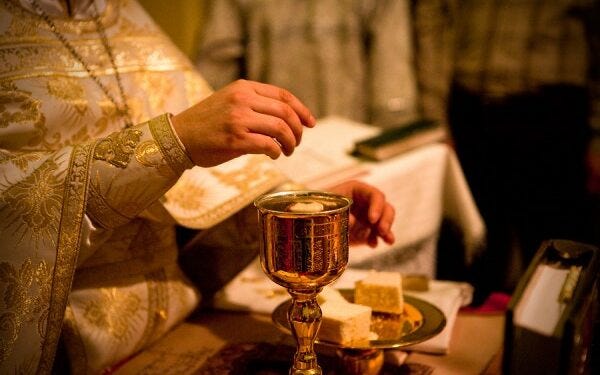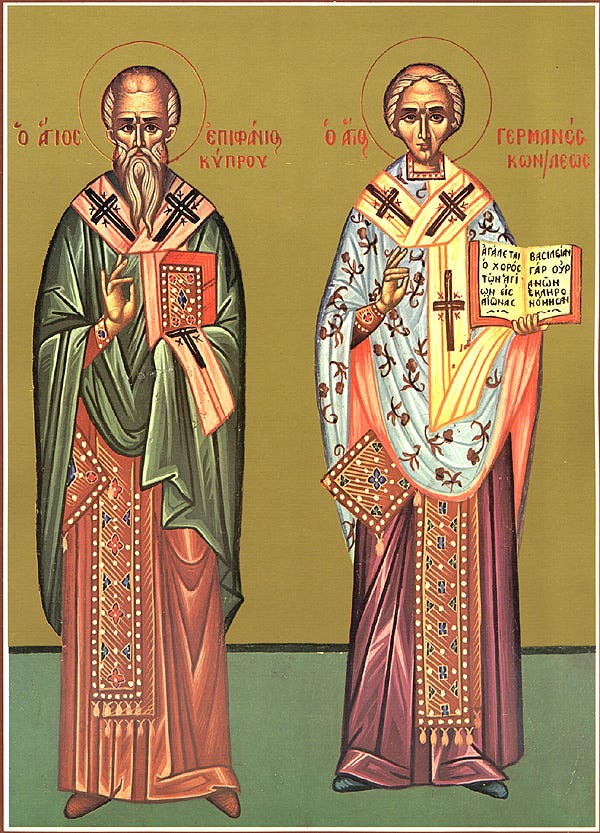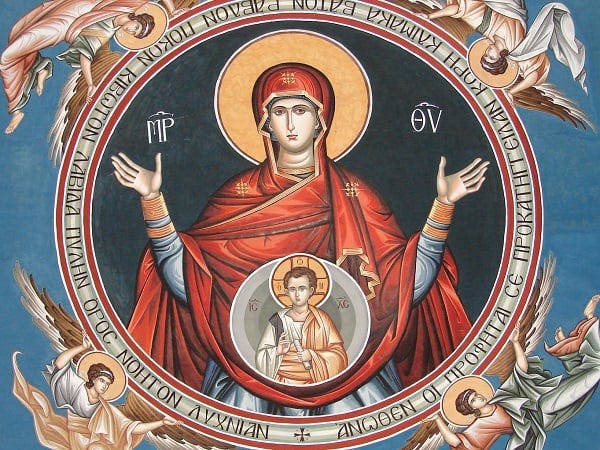“When God revealed himself, he united himself with our mortal nature in order to deify humanity through this close relation with deity. Since this is so, through his flesh, constituted by bread and wine, he implants himself in all believers.”
— St. Gregory of Nyssa, Catechetical Oration
Acts 10:1-16 (Epistle)
1 There was a certain man in Caesarea called Cornelius, a centurion of what was called the Italian Regiment,
2 a devout man and one who feared God with all his household, who gave alms generously to the people, and prayed to God always.
3 About the ninth hour of the day he saw clearly in a vision an angel of God coming in and saying to him, “Cornelius!”
4 And when he observed him, he was afraid, and said, “What is it, lord?” So he said to him, “Your prayers and your alms have come up for a memorial before God.
5 Now send men to Joppa, and send for Simon whose surname is Peter.
6 He is lodging with Simon, a tanner, whose house is by the sea. He will tell you what you must do.”
7 And when the angel who spoke to him had departed, Cornelius called two of his household servants and a devout soldier from among those who waited on him continually.
8 So when he had explained all these things to them, he sent them to Joppa.
9 The next day, as they went on their journey and drew near the city, Peter went up on the housetop to pray, about the sixth hour.
10 Then he became very hungry and wanted to eat; but while they made ready, he fell into a trance
11 and saw heaven opened and an object like a great sheet bound at the four corners, descending to him and let down to the earth.
12 In it were all kinds of four-footed animals of the earth, wild beasts, creeping things, and birds of the air.
13 And a voice came to him, “Rise, Peter; kill and eat.”
14 But Peter said, “Not so, Lord! For I have never eaten anything common or unclean.”
15 And a voice spoke to him again the second time, “What God has cleansed you must not call common.”
16 This was done three times. And the object was taken up into heaven again.
John 6:56-69 (Gospel)
56 He who eats My flesh and drinks My blood abides in Me, and I in him.
57 As the living Father sent Me, and I live because of the Father, so he who feeds on Me will live because of Me.
58 This is the bread which came down from heaven – not as your fathers ate the manna, and are dead. He who eats this bread will live forever.”
59 These things He said in the synagogue as He taught in Capernaum.
60 Therefore many of His disciples, when they heard this, said, “This is a hard saying; who can understand it?”
61 When Jesus knew in Himself that His disciples complained about this, He said to them, “Does this offend you?
62 What then if you should see the Son of Man ascend where He was before?
63 It is the Spirit who gives life; the flesh profits nothing. The words that I speak to you are spirit, and they are life.
64 But there are some of you who do not believe.” For Jesus knew from the beginning who they were who did not believe, and who would betray Him.
65 And He said, “Therefore I have said to you that no one can come to Me unless it has been granted to him by My Father.”
66 From that time many of His disciples went back and walked with Him no more.
67 Then Jesus said to the twelve, “Do you also want to go away?”
68 But Simon Peter answered Him, “Lord, to whom shall we go? You have the words of eternal life.
69 Also we have come to believe and know that You are the Christ, the Son of the living God.”
St. Epiphanius, Bishop of Cyprus (403)
Saint Epiphanius, Bishop of Cyprus, “a last relic of ancient piety,” as Saint Jerome calls him, lived during the fourth century in Phoenicia. The Roman empress Honoria was his sister. He was of Jewish descent, and in his youth he received a fine education. He was converted to Christianity after seeing how a certain monk named Lucian gave away his clothing to a poor person. Struck by the monk’s compassion, Epiphanius asked to be instructed in Christianity.
He was baptized and became a disciple of Saint Hilarion the Great (October 21). Entering the monastery, he progressed in the monastic life under the guidance of the experienced Elder Hilarion, and he occupied himself with copying Greek books.
Because of his ascetic struggles and virtues, Saint Epiphanius was granted the gift of wonderworking. In order to avoid human glory, he left the monastery and went into the Spanidrion desert. Robbers caught him there and held him captive for three months. By speaking of repentance, the saint brought one of the robbers to faith in the true God. When they released the holy ascetic, the robber also went with him. Saint Epiphanius took him to his monastery and baptized him with the name John. From that time, he became a faithful disciple of Saint Epiphanius, and he carefully documented the life and miracles of his instructor.
Reports of the righteous life of Saint Epiphanius spread far beyond the monastery. The saint went a second time into the desert with his disciple John. Even in the wilderness disciples started to come to him, so he established a new monastery for them.
After a certain time, Saint Epiphanius made a pilgrimage to Jerusalem to venerate its holy shrines, and then returned to the Spanidrion monastery. The people of Lycia sent the monk Polybios to Saint Epiphanius asking him to take the place of their dead archpastor. When he learned of this intention, the clairvoyant ascetic secretly went into the Pathysian desert to the great ascetic Saint Hilarion (October 21), under whose guidance he had learned asceticism in his youth.
The saints spent two months in prayer, and then Hilarion sent Saint Epiphanius to Salamis. Bishops were gathered there to choose a new archpastor to replace one who recently died. The Lord revealed to the eldest of them, Bishop Papius, that Saint Epiphanius should be chosen bishop. When Epiphanius arrived, Saint Papius led him into the church, where in obedience to the will of the participants of the Council, Epiphanius agreed to be their bishop. Saint Epiphanius was consecrated as Bishop of Salamis in 367.
The Prophetic Life of the Mother of God – the Pattern of Monastic Life
Monasticism is an imitation of the life of the Mother of God, which was from the beginning to the end an imitation of the way of Her Son and God. In essence, the handmaiden of God Mariam had prophetically followed the way of the Lord in Her life even before He came into the world, and She partook more than all in the judgment of the Son of God.
The life of the Holy Virgin was prophetical, because She was not only overshadowed by the Holy Spirit at the Annunciation, but also filled with the Holy Spirit. Rather, She was carried about and led by the Holy Comforter.
She uttered a word only once, singing Her hymn to the Lord, after She heard the good tidings of Archangel Gabriel and was illumined with the sacred Light of divine motherhood. The few verses of this hymn contain a prophecy, which the faithful will fulfil until the end of the world at every feast of the Mother of God: ‘Behold, from henceforth all generations shall call me blessed.’
Ever since, the Holy Virgin immersed Herself in silence. She no longer needed to utter any word, since She brought to earth the very Word of the Father. Yet the grace of Her presence was so palpable, that She imparted Her prophetic spirit to those who had the senses of their soul exercised in the spirit. Even before being born, Saint John the Baptist was the first man who magnified the Most Holy Mother of God when he leapt with joy in the womb of his mother, Elizabeth. And beyond any human logic, this righteous woman filled with the Holy Spirit was able to recognise in her young cousin, the fulfilment of the wondrous prophecy of Isaiah: ‘Behold, a virgin shall conceive, and bear a son, and shall call his name Immanuel.’[1]
The words of the Holy Virgin about the glory that She would receive from on high were truly prophetic, for they were pronounced in the Holy Spirit, since the young maiden was not charmed by any worldly glory. She had diminished Herself to the utmost before God and in Her answer to the greeting of the Archangel She only spoke of Her nothingness: ‘For He hath regarded the low estate of His handmaiden.’ However, the Most High poured forth so much grace into this nothing, into this majesty of the humility of the Mother of God, that it made the poor and insignificant maiden from Nazareth a god by grace, to whom generations and generations cry out with gratitude: ‘Rejoice thou who art god after God, holding the second place after the Holy Trinity, Thou who directly receivest the fulness of all God’s gifts and transmitest them to all, angels and man.’
For the rest of Her life, the Holy Virgin does not appear to accompany Christ when the multitudes glorify Him, when He performs mighty miracles, when He revealed His light on Tabor. She was by His side when, unable to bear His hard sayings and the holy otherness of His ethos, the multitudes would say, ‘he is beside himself,’ when they tried to stone Him to death, when He was hanging on the Cross.
The Holy Virgin was Christ’s Mother according to the flesh, and yet She was continually cutting Her will before Him, dedicating Her life to minister His holy, divine and saving will. She suffered all things with humble love, so as to allow all freedom to Christ to carry out the work which the Heavenly Father had entrusted to Him.
At times the words that Christ addressed to Her appeared to be harsh, denying the bond of the flesh that united them. However, in this way, the Lord was free to give the fearful commandment: ‘If any man come to me, and hate not his father, and mother, and wife, and children, and brethren, and sisters, yea, and his own life also, he cannot be my disciple.’[2] And while both Christ and His Mother renounced the mother-son relationship on the psychological level to the end, the Lord secretly honoured Her with even greater praise: ‘My mother and my brethren are these which hear the word of God, and do it.’[3]
Let us examine how some milestone events from the life of the Mother of God are connected with life in the spirit.
The Nativity of the Mother of God
The nativity of the Mother of God was a miracle in itself. Her parents were barren, but righteous and faithful. Their life of prayer and holiness made a barren womb yield a glorious fruit, the Mother of God.
As it was expressed in the parable of the fruitless fig tree, the will of the Lord reveals that God expects us to seek for His grace which is able to make fertile even our spiritual barrenness and bring forth our spiritual regeneration.
Entry into the Temple
The Holy Virgin was dedicated by Her parents to the temple from a tender age. The handmaiden Mariam had an uncommon love for the God of Her Fathers, and this Her love was expressed through prayer and reading of Scriptures. In the Holy of Holies She became not only the first monastic, but also the first Hesychast. She lived invoking the Name of God, reading His word, and assimilating His word in Her personal prayer.
Continuing in prayer, She found the wondrous place of Her deep heart, where She came to know the God of Her Fathers and was united with Him, through Whom She also experienced Her consubstantiality with the whole of mankind. In Her union with God, a divine state was naturally imparted to Her and the will of God became the unique law of Her existence. Yet one is the divine will that reigns in heaven, but also in the earth of the heart of those who have transferred their existence to heaven: ‘that all may be saved’. It is with this will that the Firstborn came into the world, and it is with this will that He lived, prayed, taught, suffered, died, was risen and ascended. It is this will that the Most Holy Mother of God ministered and does minister through Her intercessions.
Annunciation
The surrendering of the Holy Virgin to the divine will was perfect and indescribable, and so She became the vessel of Him Whom nothing can contain, the chariot of Him Who sits on the cherubim. There is no greater form of ascetic struggle than surrendering ourselves to the will and providence of God. This is why the Church continually exhorts her children, ‘Let us commend ourselves and one another, and our whole life to Christ our God.’
When He created the world, God brought all things from non-being into being with one word: ‘Let it be.’ Now, through the blessed ‘yes’ of Her obedience, Mariam said, ‘Be it unto me according to thy word’ and brought down to earth the Creator Himself, revealing the great miracle that occurs when the little human will is fully and voluntarily identified with the perfect divine will. The Annunciation was the culmination of the fervent love and prayer of the Holy Virgin, but also of the utter condescension of God.
In Her Person, She attained to that which the monk seeks after with a mighty thirst in the struggle of obedience: the union of the heart with the Spirit of God. She prophetically fulfilled the purpose of each Christian in general, as it is repeatedly expressed by the great apostle Paul: that of becoming a living temple not made by the hand of man, a dwelling-place of the Holy Spirit.
This week’s calendar reminders:
Monday 5/12: Matins 8:30 a.m.; Stewards’ Meeting 6:30 p.m.
Tuesday 5/13: no services or events
Wednesday 5/14: no services or events
Thursday 5/15: Matins 8:30 a.m.
Friday 5/16: Matins 8:30 a.m.
Saturday 5/17: Catechumen Class 4:30 p.m.; Great Vespers 6 p.m.
Sunday 5/18: Divine Liturgy 9:15 a.m.
CLICK BELOW to donate online:
Christ the Savior Orthodox Church is located in Southbury, Connecticut, and is part of the New England Diocese of the Orthodox Church of America.
Mailing address: Christ the Savior Church, 1070 Roxbury Road, Southbury, CT 06488
PLEASE DONATE to help our parish do the work of the Lord, thrive and grow, and extend the Kingdom of God. May the Lord bless your generosity!
Fr. Moses Locke can be reached at frmoseslocke@gmail.com











